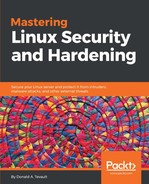You can generate user authentication reports without having to define any audit rules. Just use aureport with the -au option switch. (Remember au, the first two letters of authentication.):
[donnie@localhost ~]$ sudo aureport -au
[sudo] password for donnie:
Authentication Report
============================================
# date time acct host term exe success event
============================================
1. 10/28/2017 13:38:52 donnie localhost.localdomain tty1 /usr/bin/login yes 94
2. 10/28/2017 13:39:03 donnie localhost.localdomain /dev/tty1 /usr/bin/sudo yes 102
3. 10/28/2017 14:04:51 donnie localhost.localdomain /dev/tty1 /usr/bin/sudo yes 147
. . .
. . .
239. 12/12/2017 11:50:20 charlie 192.168.0.222 ssh /usr/sbin/sshd no 13880
244. 12/12/2017 12:10:06 cleopatra 192.168.0.222 ssh /usr/sbin/sshd no 13992
247. 12/12/2017 12:14:28 vicky 192.168.0.222 ssh /usr/sbin/sshd no 14049
250. 12/12/2017 12:30:49 charlie 192.168.0.222 ssh /usr/sbin/sshd no 14122
265. 12/12/2017 19:06:20 charlie 192.168.0.222 ssh /usr/sbin/sshd no 725
269. 12/12/2017 19:23:45 donnie ? /dev/pts/0 /usr/bin/sudo no 779
[donnie@localhost ~]$
For login events, this tells us whether the user logged in at the local terminal or remotely through Secure Shell. To see the details of any event, use ausearch with the -a option, followed by the event number that you see at the end of a line. (Strangely, the -a option stands for an event.) Let's look at event number 14122 for Charlie:
[donnie@localhost ~]$ sudo ausearch -a 14122
----
time->Tue Dec 12 12:30:49 2017
type=USER_AUTH msg=audit(1513099849.322:14122): pid=11632 uid=0 auid=4294967295 ses=4294967295 subj=system_u:system_r:sshd_t:s0-s0:c0.c1023 msg='op=pubkey acct="charlie" exe="/usr/sbin/sshd" hostname=? addr=192.168.0.222 terminal=ssh res=failed'
The problem with this is that it really doesn't make any sense. I'm the one who did the logins for Charlie, and I know for a fact that Charlie never had any failed logins. In fact, we can correlate this with the matching entry from the /var/log/secure file:
Dec 12 12:30:53 localhost sshd[11632]: Accepted password for charlie from 192.168.0.222 port 34980 ssh2
Dec 12 12:30:54 localhost sshd[11632]: pam_unix(sshd:session): session opened for user charlie by (uid=0)
The time stamps for these two entries are a few seconds later than the timestamp for the ausearch output, but that's okay. There's nothing in this log file to suggest that Charlie ever had a failed login, and these two entries clearly show that Charlie's login really was successful. The lesson here is that when you see something strange in either the ausearch or aureport output, be sure to correlate it with the matching entry in the proper authentication log file to get a better idea of what's going on. (By authentication log file, I mean /var/log/secure for Red Hat-type systems and /var/log/auth.log for Ubuntu systems. The names may vary for other Linux distros.)
